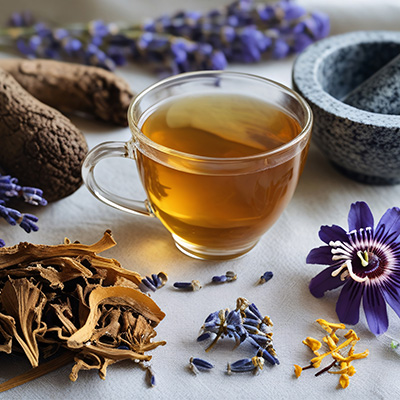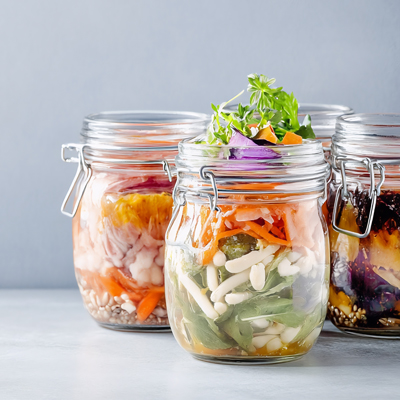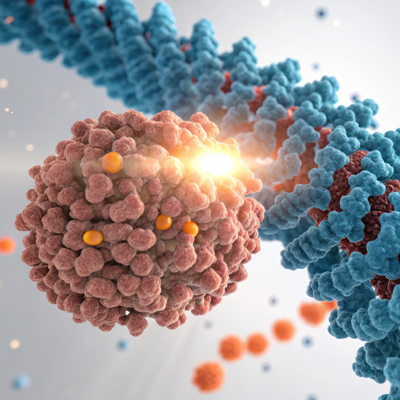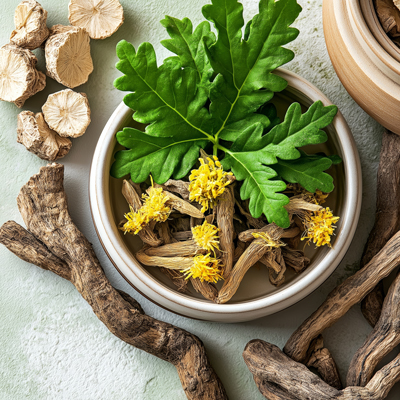Secondary Plant Compounds
All information about "Secondary Plant Compounds" and the related magazine articles can be found here.
Our articles are written clearly and link to scientific studies where relevant. This is how we meet our own standards: we regularly deliver new, high-quality content for you—free of charge, no sign-up required, with the highest possible benefit to you.

Your rest compass for the summer: Naturally in balance with saffron.
Gentle support from nature for mental serenity and your well-being
Does your inner rhythm sometimes falter in the hustle and bustle of everyday life and does your serenity wane? With saffron, nature offers a valued way to harmonize the carousel of thoughts and cultivate your inner center. Discover here how the red gold can lead you back to new balance and lightness.

Inner peace for hot days, with GABA and rose root extract
Support your nervous system with herbal active ingredients that can reduce stress, stabilize your mood and promote your mental balance even in the summer heat.
Summertime often brings stress due to heat, travel or busy schedules. GABA and the adaptogenic rose root extract help you to get through the summer more calmly by promoting your stress resistance and inner peace. So you can enjoy your emotional balance and greater well-being.

Light legs, light day. How horse chestnut, vitamin C and OPC help against heaviness
Discover how proven plant extracts and vitamins can relieve the feeling of heavy legs. For more lightness in everyday life for mom, grandma & co.
Heavy legs after a long day? Horse chestnut, vitamin C and OPC can promote blood circulation, strengthen the veins and noticeably relieve the feeling of tired, weighed-down legs. Ideal for anyone who stands a lot, walks a lot or simply wants to stay active in everyday life. Whether mom is out shopping or grandma is out for a walk. Find out how these natural active ingredients support your leg health and give you new lightness.

Mental strength in summer?
Ashwagandha and roseroot help you stay calm and alert on hot days
Summer brings light, energy and sometimes a lot of stress. So it's a good thing that nature has two herbal allies in the form of ashwagandha and roseroot, which can promote mental balance and resilience. Find out more!

Rescue for cozy summer evenings
Natural mosquito repellent with vitamin B1 & essential oils
Whether it's a garden party or an evening stroll: as soon as it starts buzzing, the mood is gone. Vitamin B1 and essential oils such as citronella or lavender can help to gently keep mosquitoes away. How does this work? Read here how natural remedies ensure carefree summer evenings.

Summer, sun, full concentration!
How phosphatidylserine and omega-3 can boost your concentration
The sun is shining but your concentration is waning? Discover how phosphatidylserine and omega-3 fatty acids can naturally boost your mental performance.

Relaxed baby bump: Natural support with inositol, folic acid, cranberry & D-mannose
Balance and well-being for women who want to have children or during pregnancy
Wanting to have children or already pregnant? A lot changes during this special phase. Smart nutrients such as inositol, folic acid, cranberry and D-mannose can provide targeted support: They promote hormonal balance, strengthen the urinary tract and bring more balance to everyday life. Find out now how you can do something good for yourself naturally.

Start your vacation full of energy with potassium & magnesium citrate
How to keep you and your family fit, active and balanced even in the heat
On summer vacation, electrolytes such as potassium and magnesium quickly become unbalanced. This can affect energy, muscles and concentration. Find out here how you can strengthen your inner balance with smart nutrition and targeted supplements.

Strong heart, strong life. Promoting men's health naturally
Gain new energy and vitality with coenzyme Q10, chokeberry as a medicinal plant and targeted care for the cardiovascular system.
The heart is the engine of your life - and men in particular should pay special attention to it. Find out how you can use the effects of coenzyme Q10, the healing power of the aronia berry and a healthy lifestyle to strengthen the function of your cardiovascular system and support your overall health as a man.

When the hormone balance changes
Gentle nutritional support through the menopause
The menopause changes many things - both physically and emotionally. Myo-inositol, vitamin D3 and magnesium can help to boost your well-being, support your metabolism and activate new sources of energy. Find out more here!

Comfort food for super moms
Choline, lecithin & vitamin B12 - powerful micronutrients for a strong pregnancy
Did you know that certain nutrients can have a positive effect not only on your well-being, but also on your baby's development? Choline, lecithin and vitamin B12 are little helpers with a big effect - for strong nerves, clear thoughts and a good gut feeling during this special time.

Playground power for every day
Calcium & vitamin K2: For bone health that grows with you
Whether romping around with the children or the daily balancing act between job and family - strong bones are the stable foundation. Find out how calcium and vitamin K2 can playfully help to strengthen your bones.

Naturally powerful: Turmeric, boswellia & ginger
Learn how to gain more zest for life with plant power
Plant-based active ingredients can help to reduce inflammation and make everyday life more active and mobile - whether in the garden, during sport or on a family outing.

Finally sleep well again - even in summer!
Discover natural sleep aids with melatonin, passion flower & co.
Is the summer light depriving you of sleep? We show you how you can support your sleep-wake rhythm with natural remedies such as melatonin and passionflower.

Sun protection from within - with the power of vitamin A, astaxanthin and omega-3
Strengthen your skin with natural nutrients that reduce oxidative stress, soothe inflammation and prevent premature ageing.
The first rays of sunshine are here - but your skin is particularly sensitive after the winter. Discover how vitamin A, the antioxidant astaxanthin and essential omega-3 fatty acids can protect your skin from the inside out and optimally prepare it for UV radiation. For a radiantly healthy complexion and effective anti-ageing support.

Spring cleaning for the body!
Drain naturally - with nettle, dandelion & potassium
Find out more about dandelion, stinging nettle and potassium to gently drain your body and get back on track with ease!

Naturally against allergies - Black cumin oil and quercetin in use for your well-being
Gentle support from nature for hay fever, pollen allergies and allergic reactions
Itchy eyes, sneezing attacks and constant pollen stress? Black cumin oil and quercetin offer natural help for allergic symptoms. Find out how the two herbal active ingredients work, when it is the right time to use them and what you should look out for when choosing them.

Strong through the pollen season with omega-3 and vitamin E
How to strengthen your child's airways
When pollen irritates the airways, it can quickly become unpleasant for children. Find out why omega-3 and vitamin E can not only support but also prevent and how you can easily incorporate the two substances into your everyday life!

Fit for spring: Stimulate metabolism with inulin, probiotic foods & intestinal cure
Intestinal cleansing for better digestion, the natural effects of inulin and the benefits of probiotic foods for your metabolism
Get a vital start to spring and bring your body into balance - with targeted nutrition that boosts your metabolism, supports digestion and rebalances your gut with the help of a gut cleanse, inulin and probiotic foods. Find out how to boost your gut health and gain new energy - from the inside out!

New cell energy with B vitamins, NADH and alpha lipoic acid
NADH, alpha lipoic acid and B vitamins play a central role in human metabolism for energy, concentration and cell protection.
Discover how these nutrients support the body against exhaustion, oxidative stress and loss of performance - for more vitality and mental strength in everyday life!

Sleep better with lemon balm, passionflower and L-theanine
These natural helpers bring peace to your evening
Sleep disorders? Stress in the evening? Herbal helpers such as lemon balm, L-theanine and passionflower can gently support the sleep-wake rhythm and help you to finally calm down. Read the article now to find out how you can harness the power of nature for restful nights.

Spring fever for the soul
Naturally more balance with 5-HTP, L-tryptophan and vitamin B6
The sun is shining - but everything still feels heavy inside?
These three mood boosters gently help you arrive in spring: for more rest, sleep and stability. Find out more here!

Building inner strength - more relaxed through spring
Plant adaptogens for more balance, energy and mental freshness
Spring is the perfect time to recharge your batteries and do something good for yourself. Rhodiola and cordyceps provide natural and effective support. Find out more here!

Strengthen your immune system with rockrose, zinc and vitamin C
Natural support for your immune system
Cistus, zinc and vitamin C can provide your body with valuable support in moody weather. Find out how these three building blocks gently strengthen your defenses and give you more well-being in everyday life.
Secondary plant substances: important for our health
Secondary plant compounds have only recently attracted the attention of science and the health industry. As their name suggests, phytochemicals are found exclusively in plants and are known to provide numerous health benefits that go beyond the basics provided by our usual nutrients.
But what exactly are phytochemicals and how can they positively influence our well-being? We answer these and other questions about phytochemicals in this article.
What are secondary plant substances?
Secondary plant substances, also known as phytonutrients, are chemical compounds produced by plants. In contrast to the primary plant substances, which are essential for the growth and development of the plant, secondary plant substances play a supporting role. For example, they serve as natural defense mechanisms against pests, UV radiation or other environmental influences.
These substances are not essential for the human body, but can still offer a variety of health benefits. The German Nutrition Society emphasizes the importance of these substances for a healthy diet and recommends consuming a variety of plant-based foods in order to benefit from the positive effects of phytochemicals [1].
What different plant substances are there?
Secondary plant substances can be divided into various groups that differ in their chemical structure and specific effects. This diversity enables them to offer a wide range of health benefits.
The best-known groups include:
Carotenoids: These colorants give fruit and vegetables their yellow, orange and red hues. Beta-carotene, a typical representative of this group, is found in carrots and pumpkins, for example. Carotenoids are not only important for plant pigmentation, but also play a role in human health by acting as antioxidants and can support eye health. [2]
Flavonoids: This group includes a variety of compounds found in almost all plants. They are known for their strong antioxidant effects and are found in high concentrations in berries, citrus fruits and green tea. Flavonoids also contribute to cardiovascular health by improving blood vessel function and exhibiting anti-inflammatory properties. [3]
Polyphenols: This group includes a variety of compounds found in fruits, vegetables, nuts and beverages such as coffee and red wine. They are known for their antioxidant and anti-inflammatory properties, which can help reduce the risk of chronic diseases [4]. Polyphenols can also positively influence the microbiota in the gut, which in turn has an effect on the immune system.
Glucosinolates: These sulphur-containing compounds are typical of cruciferous vegetables such as broccoli, cabbage and Brussels sprouts. They give these vegetables their characteristic, slightly bitter taste. When consumed, glucosinolates can be converted into biologically active compounds that can reduce the risk of cancer and promote detoxification processes in the body [5].
Essential oils: These volatile compounds are responsible for the fragrance and flavor of many herbs and spices. In addition to their sensory properties, they also have potential health benefits as they can have antimicrobial and anti-inflammatory properties. [6]
Saponins: These compounds are found in legumes and some vegetables. They can reduce cholesterol absorption in the intestine and possibly protect against certain types of cancer. [7]
Phytoestrogens: These plant compounds are similar in structure to human oestrogen. They are mainly found in soy products and flaxseed and may influence the risk of hormone-dependent cancers [8].
Sulphides: These sulphur-containing compounds are mainly found in garlic and onions. They may have antibacterial properties and may reduce the risk of cardiovascular disease. [9]
Chlorophyll: The green pigment in plants has antioxidant properties and may help detoxify the body. [10]
Are phytosterols secondary plant substances?
Yes, phytosterols are secondary plant substances. They even deserve special attention, as they can play an important role in lowering cholesterol levels.
Phytosterols, also known as plant sterols, are very similar to cholesterol in their chemical structure. This similarity is the key to their cholesterol-lowering effect. When you eat foods containing phytosterols, they compete with cholesterol in the intestine for absorption into the body. As phytosterols are less well absorbed by the body than cholesterol, this leads to reduced cholesterol absorption. [11]
Phytosterols occur naturally in many plant foods, especially in:
- Vegetable oils (e.g. sunflower oil, rapeseed oil)
- Nuts and seeds
- Wholegrain products
- Legumes
- Fruit and vegetables
In recent years, the food industry has also started to enrich certain products with phytosterols to increase their cholesterol-lowering effect. For example, you can find margarine or yogurt drinks with added phytosterols in the supermarket. The cholesterol-lowering effect of phytosterols is scientifically well documented. But beware: according to one study, excessive phytosterol levels can lead to an increase in the risk of heart attack in coronary heart patients [12].
Health-promoting effect of phytochemicals
Although phytochemicals are often only found in small quantities in our food, they can have a significant impact on our health:
Antioxidant effect: Many phytochemicals act as antioxidants. This means that they can neutralize free radicals, which can otherwise cause cell damage and contribute to premature ageing and various diseases [13].
Anti-inflammatory properties: Some phytonutrients can reduce inflammatory processes in the body. This is particularly important as chronic inflammation is associated with many diseases.
- Cancer prevention: Certain phytonutrients may be able to reduce the risk of various types of cancer.
- Cardiovascular protection: Some phytonutrients can lower cholesterol levels, regulate blood pressure and thus reduce the risk of cardiovascular disease.
- Support of the immune system: Certain phytonutrients can strengthen the function of our immune system and thus better protect us against infections.
- Protection against UV radiation: Some phytonutrients, in particular certain carotenoids, can provide natural protection against harmful UV radiation.
How to make the most of phytochemicals for your health
To prevent health risks and benefit as much as possible from the positive effects of phytochemicals, we have a few tips for you:
Eat colorful food: Different colors of fruit and vegetables often represent different phytochemicals. Red tomatoes, for example, contain lycopene, while green broccoli is rich in glucosinolates. The more colorful your plate, the more diverse the phytonutrients.
- Eat seasonally: Fruit and vegetables that are harvested at the right time of year often contain more phytonutrients.
- Gentle preparation: Many phytonutrients are sensitive to heat. Steaming or briefly sautéing can help to preserve more of these valuable compounds.
- Don't peel: In many types of fruit and vegetables, the phytochemicals are located directly under the skin. If possible, eat the peel as well.
Combine wisely: Some phytochemicals are better absorbed by the body when they are combined with certain other nutrients. For example, beta-carotene is better absorbed when consumed together with some fat.
- Go for whole grains: whole grain products contain more phytochemicals than highly processed grain products.
- Don't forget herbs and spices: these are also rich in phytochemicals and can enhance your meals not only in terms of taste but also in terms of health.
Superfoods and phytochemicals
Superfoods have attracted a lot of attention in recent years, and not without good reason. These special foods are rich in phytochemicals that have a variety of health-promoting properties. Among the best-known representatives are goji berries, acai, matcha tea and chia seeds, all of which have impressive bioactive compounds.
Goji berries are an excellent example: they contain high amounts of carotenoids, especially zeaxanthin, which is important for the health of our eyes. Acai berries also stand out as they are rich in anthocyanins - a group of flavonoids that have strong antioxidant properties and can therefore contribute to cell health. Matcha tea impresses with its high content of catechins, in particular epigallocatechin gallate (EGCG), which is known for its potential anti-cancer properties [14]. Chia seeds, on the other hand, contain lignans, which have estrogenic effects and may reduce the risk of hormone-dependent cancers. The miracle tree moringa is also a popular superfood [15].
How many phytochemicals do humans need?
There is no specific, universally valid recommendation for the daily intake of phytochemicals. The reason for this is that there is a wide variety of these compounds and their effects are complex and often synergistic. Instead, nutrition experts generally recommend following a varied and plant-based diet to benefit from the health benefits of phytochemicals.
Secondary plant substances - little helpers with a big effect
Secondary plant substances are nature's true miracle cures. Although they are only found in small quantities in our food, they can have a significant impact on our health. From lowering cholesterol levels and protecting against free radicals to supporting our immune system: the positive effects of these plant compounds are manifold and should not be ignored.
Secondary plant substances work best as part of a balanced, plant-based diet. Individually isolated substances in the form of food supplements may not have the same effect as the naturally occurring compounds in food.
The message is therefore clear: a diet rich in fruit, vegetables, wholegrain products, nuts and pulses not only prevents vitamin deficiency and provides important minerals, but also a wealth of health-promoting secondary plant substances.
By enriching your diet with a variety of plant-based foods, you are doing something good for your body and investing in your long-term health. Secondary plant substances may be small, but their effect is huge. They are another good reason to put more plants on our plates: cheers to the power of nature!
Sources
[1] https://www.dge.de/wissenschaft/fachinformationen/sekundaere-pflanzenstoffe-und-die-gesundheit/[2] https://www.studysmarter.de/studium/lebensmittelwissenschaften/naehrstoffe-lebensmittelwissenschaften/carotinoide/
[3] https://www.spektrum.de/news/flavonoide-sekundaere-pflanzenstoffe-schuetzen-die-blutgefaesse/2243404
[4] https://pubmed.ncbi.nlm.nih.gov/33477894/
[5] https://pubmed.ncbi.nlm.nih.gov/33456268/
[6] https://meingesundheitstest.de/aetherische-oele-gegen-chronische-entzuendungen/
[7] https://www.bdc.de/warum-sekundaere-pflanzenstoffe-vor-krebs-schuetzen-koennen/
[8] https://pubmed.ncbi.nlm.nih.gov/36753952/
[9] https://www.verbraucherservice-bayern.de/themen/ernaehrung/sulfide-eine-gruppe-der-sekundaeren-pflanzenstoffe
[10] https://lpi.oregonstate.edu/mic/dietary-factors/phytochemicals/chlorophyll-metallo-chlorophyll-derivatives
[11] https://www.medmedia.at/apotheker-krone/phytosterine-natuerliche-optimierung-der-blutfette/
[12] https://www.imd-berlin.de/spezielle-kompetenzen/nahrungsmittelshyunvertraeglichkeiten/phytosterin-resorption
[13] https://www.bzfe.de/ernaehrung/ernaehrungswissen/essen-und-wissen/sekundaere-pflanzenstoffe/
[14] https://pubmed.ncbi.nlm.nih.gov/32660101/
[15] https://www.vitalstoff-lexikon.de/Sekundaere-Pflanzenstoffe/nbspLignane/Interaktionen
